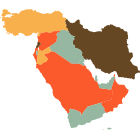Improving Mental Health and Wellbeing of All Women, Men, Boys, Girls and Gender-Non-Conforming Individuals Living in Lebanon
Background
In partnership with the Agence Française de Développement (AFD), Triangle has launched an initiative aimed at enhancing mental health and wellbeing across Lebanon. This project, initiated in November 2021 and implemented with Médecins du Monde (MdM), Skoun, Embrace, and the National Mental Health Program (NMHP), seeks to provide accessible, gender-sensitive mental health and psychosocial support (MHPSS) in Beirut, Baalbek, and Tripoli, focusing on reducing stigma associated with mental health and substance use.
Acknowledging the complex crises Lebanon has faced since 2019, Triangle is redefining mental health frameworks to better integrate gender sensitivities and adapt to the evolving societal needs. This innovative approach has led to the development of a comprehensive strategy that reshapes how mental health services are delivered.
The project completed its first phase in 2023, focusing on strategy development and assessment. Currently in Phase II, the initiative is implementing and evaluating these strategies, closely monitoring their effectiveness and the real-time dynamics of community health needs. This phase aims to refine interventions based on ongoing feedback and expand their impact throughout the target regions.
Triangle Assignment
Triangle provides analytical support to AFD’s gender programming in Lebanon, assessing and refining the gender strategy integral to the project. This involves evaluating the programmatic integration of gender concerns, fine-tuning the logical framework, and enhancing the project’s Monitoring, Evaluation, and Learning (MEL) framework to ensure effective and inclusive implementation.
Triangle undertook the following key tasks:
- Evolution of Gender-Sensitive Approaches: The project began its assessment by recognizing the need for integrating gender-responsive approaches within Lebanon’s mental health services, especially in the context of the country’s severe socio-economic challenges. The project utilized data and feedback from initial program implementations to highlight disparities and areas needing urgent attention, with significant insights gained from 2021 onwards.
- Drivers of Gender Disparities: Analysis identified critical factors contributing to gender disparities in mental health access, including societal stigma, unequal gender norms, and the compounded impact of Lebanon’s economic crisis and the COVID-19 pandemic. These factors have severely affected the availability and quality of mental health services, leading to a lack of gender-sensitive care and support.
- Impact of Socio-economic Conditions: The prevailing economic conditions have intensified the need for mental health services. Financial hardships and social instability have exacerbated mental health issues across all genders, with women and gender-non-conforming individuals disproportionately affected due to existing inequalities.
- Changing Dynamics: Traditional mental health service frameworks have proven inadequate in addressing the nuanced needs arising from evolving socio-economic conditions. The project’s strategy focuses on adapting these services to be more gender-responsive, ensuring equitable access and effectiveness.
- Geographic Variability: The availability and effectiveness of gender-sensitive mental health services vary significantly across different regions of Lebanon, necessitating a tailored approach to each area. The project focuses on Beirut, Baalbek, and Tripoli, adapting strategies to the specific challenges and needs of these communities.
- Urgent Need for Tailored Approaches: The deteriorating socio-economic situation poses a severe threat to the mental wellbeing of Lebanon’s population, underscoring the urgent need for effective, gender-sensitive mental health strategies. The project emphasizes the importance of understanding these dynamics to develop and implement effective interventions.
- Research Objectives: The project aims to inform stakeholders by assessing the implementation of gender-sensitive strategies in mental health services. Through ongoing monitoring and evaluation, it seeks to understand the effectiveness of these strategies and their impact on the targeted populations.
- Methodology: The assessment process includes comprehensive methods such as feedback analysis, capacity assessments, and user perception surveys. This approach allows for real-time adjustments and detailed understanding of the intervention’s impact.
- Capacity Requirements: The project requires a dedicated team with expertise in gender studies, mental health, and crisis management within socio-economically challenged environments. A commitment to gender sensitivity and ethical practices is crucial.
- Role of AFD and Responsibilities: AFD oversees the project, ensuring alignment with international standards and local needs. AFD’s role includes guiding the project’s strategic direction, approving methodologies, and monitoring outcomes to ensure the project’s goals are met effectively.
Project:
Improving Mental Health and Wellbeing of All Women, Men, Boys, Girls and Gender-Non-Conforming Individuals Living in Lebanon

Duration:
Phase I: November 2021- December 2023
Phase III: January 2023- Ongoing
Lebanon
